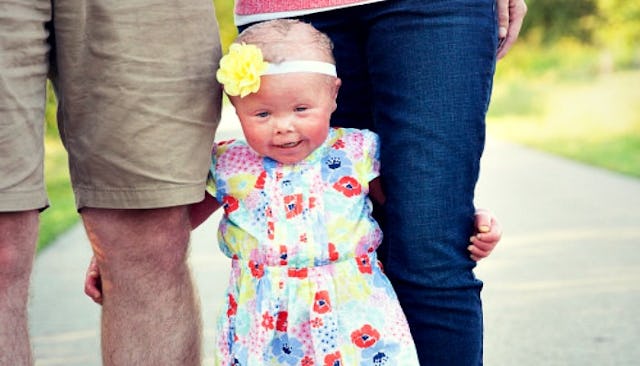How I'm Empowering My Daughter Who Has Physical Differences

I wanted to insert myself into the conversation happening a few feet away from me, to explain and to defend, but I held back.
I craned my neck a bit, waiting to hear what my children would say to the little girl who had just asked about my daughter’s red, peeling skin.
“She has a skin addition,” Connor said, and I had to hide my smile over his error, as he obviously meant “skin condition.” But then, as I thought about it a little more, skin addition is pretty accurate too—after all, Brenna’s body produces too much skin!
“Yeah,” Brenna chimed in.
“Oh,” said the little girl, still watching Brenna. And then she all but shrugged like that explanation was good enough for her and continued playing next to my kids.
I could have offered more information. I could have explained that was how Brenna was born, that she has really dry skin, that she has to wear lotion that makes her a little shiny, that this is how God created her.
But if I had jumped into the conversation, would I have conveyed something else? Would I have made the little girl feel bad for asking? Would I have attracted unwanted attention for Brenna? Would I have created a bigger issue than it needed to be? Would I have placed a shield in front of my daughter when she didn’t need it?
One of my greatest motherly desires is to instill autonomy, self-respect, and strength within my children, so that they can fly out into the world with responsibility and confidence and a deep sense of who they are as beautiful and unique people created by one very awesome God. And when it comes to Brenna, who faces the world with such physical differences, I find myself backing off more and more—very reluctant but well-intentioned—pushing my baby bird out of the nest instead of sheltering her under my wings.
I know she will face all kinds of public reaction to her skin differences, whether I am there or not. So I’m grappling with giving her what often feels like less advocacy, but what I hope will be the best kind of gift: the opportunity to answer for herself. I’m trying to equip her with encouragement and support instead of teaching her the way she should feel. I don’t want my words to become her words or my reactions to become her reactions.
As her mother, my story feels very different than hers. My story often feels more protective and defensive. And I am very aware that many experiences are much harder on me than on her because of this.
I know it is crucial for Brenna’s confidence and her inner strength to experience questions and choose her own reactions and responses instead of taking her cue from me and my reactions. What she will feel as the object of stares and comments will be very different than what I feel as her mother, and I hope that we can both support each other in every new situation and season of life as we strive for the kind of grace-filled advocacy found in living out God’s purpose for our lives.
And physical differences or no, our kids often gain far more from us backing off than stepping in.
A few months ago, Brenna came home sharing about a new little boy who had just joined her morning preschool class. He had, she told us, pointed at her and said, “Your face is red.”
“What did you say?” we asked her.
“I said, ‘yes,'” she nodded firmly, confidently.
No shame. No embarrassment. No offense. Just an observation, and an affirmation: Yes, that’s how I look.
And with that confident one-word answer, all of those previous experiences with questions from other children that made me stiffen and force myself to hold back became what I was hoping for: opportunities to teach my daughter to be proud of who she is and how she can choose to meet those around her, in her own way.
This article was originally published on